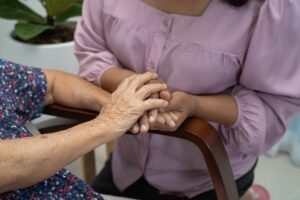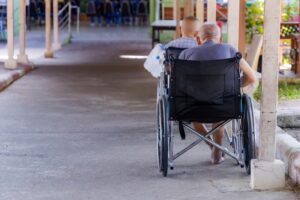Nursing Home Red Flags You Shouldn’t Ignore When Visiting
Nursing Home AbuseNursing homes promise to provide care and support for people who cannot care for themselves for many reasons, including physical limitations, dementia, and much more. Families put extraordinary trust and financial resources into long-term care facilities to ensure their family member or friend is well cared for. Sometimes, this does not happen. There are many reasons why sub-par care occurs, but despite the reason, it can often result in harm to the nursing home resident.
It is often up to family members to advocate for nursing home residents and keep them safe and free from neglect and abuse. If you visit a loved one in a facility, you need to know what red flags to look for that can indicate something is wrong. If you have concerns, never hesitate to discuss them with a nursing home attorney.
Being Present Matters
Family members should try to visit with their loved ones whenever possible. Do so at all times of the day and even into the evening. Show up without telling anyone you are coming. Doing this allows you to see what is occurring at different times and may help determine if your family member is receiving proper care.
Knowing what to look for is critical when you stop in, as that can indicate if your family member is at risk. The following are some of the most important red flags you need to watch for to help protect your family members.
Unanswered Phone Calls
 All nurses and support staff should always prioritize meeting the patient’s needs. Phone calls are secondary to this. Yet, if you are struggling to get information, get a hold of anyone or get an update from your family member’s nurse or support team for the day that indicates something is wrong.
All nurses and support staff should always prioritize meeting the patient’s needs. Phone calls are secondary to this. Yet, if you are struggling to get information, get a hold of anyone or get an update from your family member’s nurse or support team for the day that indicates something is wrong.
Does the location have enough staffing to meet these needs? Is there a concern the nurse does not want to tell you about yet? Perhaps they simply are rude and do not want to communicate with families. These all indicate that your family member may need more support. If they treat you like this, imagine how they treat your loved one.
As the main point of contact, you should be alerted when any change in your family member’s health or quality of life occurs. You should also receive regular updates and communication from them.
Physical Injuries
Do not ignore any type of physical injuries, even if your family member tries to brush them off. Some of the most concerning include:
- Unexplained bruises
- Red marks that indicate abrasion or burns
- Uncovered wounds
- Bedsores
- Unexplained falls or medical needs
- Lacerations on the skin
- Bandages that are saturated and unchanged
In certain situations, your family member may not disclose what happened; in other cases, they might not even be aware. You should demand that the nurse or other staff member thoroughly explains any type of injury you observe. Any recurring pattern of injury or unexplained areas of skin damage should raise concerns and prompt you to take action. Your attentiveness to these details is crucial in ensuring the safety and well-being of your family members.
Changes in Mental Health
The transition into a nursing home is challenging for everyone. You can expect your family members to be upset or to struggle with limitations on their movements or decision-making. However, sudden changes in their personality or their withdrawal from interactions with you may indicate discomfort or potential abuse.
Nursing home abuse can manifest in various forms, with emotional abuse being a direct concern in some instances. Consider how this can impact your family members:
- Being verbally abused is defeating to their self-confidence
- They feel as if they are a burden
- They may feel as though they are no longer valued
- They are belittled or told they do not matter
- They do not receive respect
Over time, this can lead to a change in mental health. Depression, anxiety, frequent crying, outbursts, and even intense anger are possible. Do not assume this is due to mental health complications related to end-of-life or conditions like dementia. Ensure you assess the impact of their treatment and how it can potentially restrict them.
Also note that if your family members become despondent, meaning they are withdrawn, not speaking to you as often, or no longer interested in things they used to be, that can be an indication of depression and abuse. For many individuals, this occurs as a result of their treatment.
Dirty and Unsafe Conditions
As soon as you enter a nursing home, pay attention to what is happening around you. Where are the employees? What are they doing? Then, consider the following:
- Are the hallways clean and free of clutter? If not, that can create a trip hazard.
- Is there a strong odor? It can be due to a lack of cleanliness or soiled clothing and bed linens not receiving the care they need.
- Are lights going off at the nurse’s station, and are the people working just ignoring them?
- Do you notice slippery floors or areas without warning about damage, like a dripping ceiling?
- Is there access to outdoor areas that are both safe and comfortable?
These signs may not always indicate direct instances of abuse, but they serve as warning signals that someone may be at risk. It’s crucial to respond promptly to any signs of potential danger and take proactive steps to prevent unnecessary risks. While every nursing home strives to prevent accidents, it’s important to highlight any evident risks. Additionally, documenting what you observe can provide valuable evidence and support in addressing concerns and ensuring the safety of residents.
Lack of Socialization
 There are many times that residents in a nursing home cannot physically move from room to room or to areas like dining areas or living spaces on their own. They rely on the staff to help them safely move. If nursing homes do not provide opportunities – and enough staff – to manage this, it can lead to a lack of socialization. While that may not seem like an important factor in your family members’ health, it does impact their quality of life. They have a right to be social.
There are many times that residents in a nursing home cannot physically move from room to room or to areas like dining areas or living spaces on their own. They rely on the staff to help them safely move. If nursing homes do not provide opportunities – and enough staff – to manage this, it can lead to a lack of socialization. While that may not seem like an important factor in your family members’ health, it does impact their quality of life. They have a right to be social.
Suppose there is an obvious indication that your family member is not getting the socialization they deserve. In that case, it can result in numerous negative outcomes, including the onset of depression and even early death due to a loss of quality of life. Look for signs of this in several ways:
- Do you notice residents in a variety of areas of the location?
- Can residents go outside for some sun?
- Are the nurses willing to take patients from one area to the next when they desire?
- Do residents have to isolate themselves in their rooms for meals?
- Are there planned activities that take place?
- What type of physical activities can people get involved with?
Ask your family members about what they did today. Did they watch TV all day? Did they get a chance to socialize with their neighbor? If there is a significant lack of socialization, it will impact your family member’s quality of life. Do not ignore this red flag indicating your family member may not receive the type and level of care they need.
Poor Personal Hygiene
Consider your family member’s appearance carefully. The care they receive for personal hygiene can be a subtle yet crucial indicator of potential abuse. Look for these signs:
- Are they wearing the same clothing for more than 24 hours?
- Are their sheets clean or noticeably dirty?
- When were they last bathed in some manner?
- Consider seating in the room, too. Is it dirty or filthy?
- Is their hair unkempt?
These signs indicate that your family member may not receive adequate care and support tailored to their needs. Another concerning behavior to watch for is if your family member consistently refuses to change their clothing, which can suggest an attempt to conceal their health condition or injuries from you. It’s crucial to inquire about any observed behaviors or concerns directly. Asking questions lets you gain insight into your family member’s well-being and ensures prompt and appropriate resolution of any issues.
Lack of Privacy
Another warning sign indicating that your family member is not receiving proper treatment arises unexpectedly. They do not have any privacy. This is a critical factor for many people since it nearly always represents a component of dignity. While many people need help getting up and changing their clothing and may need someone to help them with toileting and bathing, they should still have privacy.
- Are they allowed to keep their door shut? If not, why?
- When they are getting bathed or going to the bathroom, does the staff keep the doors closed or pull the curtain?
- Are they treated disrespectfully, such as a staff member calling down the hallway that they need a bedpan?
Privacy is also worrisome when a person constantly interferes with their actions. For instance, if a staff member consistently remains in the room while you are on the phone with your family, it can suggest they are concerned about the communication. Are they given full privacy when the family is visiting? There should be no monitoring devices to listen to your conversation during that time.
Access to Visitors
 Limitations on the access to when and how many visitors a person can have is a newer problem in some nursing homes. Brought on by the pandemic in which people were restricted from visiting or had to limit how many people were visiting, it can violate a person’s rights in some situations. The primary care person or point of contact may be allowed to visit at any time, unannounced, if there are significant restrictions that present an opportunity for a person to face injury or abuse when no one else can be there.
Limitations on the access to when and how many visitors a person can have is a newer problem in some nursing homes. Brought on by the pandemic in which people were restricted from visiting or had to limit how many people were visiting, it can violate a person’s rights in some situations. The primary care person or point of contact may be allowed to visit at any time, unannounced, if there are significant restrictions that present an opportunity for a person to face injury or abuse when no one else can be there.
What Can You Do If You Suspect Abuse?
Neglect and abuse in a nursing home can happen in many ways. Some examples of types of abuse include:
- Physical abuse: This includes hitting, being held in restraints, or otherwise hurting a person
- Emotional abuse: This form comes from the inflection of some type of mental anguish such as isolation, intimidation, threatening words, or force.
- Sexual abuse: A very hard-to-spot problem because residents may not talk about it; sexual abuse is any type of non-consensual sexual conduct or behavior toward a person in a nursing home.
- Active neglect: This term refers to any instance in which a person is punished, such as not given medication, water, food, or medical care for any reason.
- Passive neglect: This occurs in situations where the lack of care is often unintentional but still occurs, often due to factors like understaffing.
- Financial abuse: Access or use of a person’s finances, including fraudulent charges on their Medicare or Medicaid, can also be abuse, including in instances in which a resident seems to give away their assets.
Take immediate action when you spot any signs that these threats can impact your family members’ well-being.
- Report the abuse immediately to the nursing staff. Document what you told them and when. Document the actions they took and the statements made.
- Report the abuse to the local department of health. Do not assume the staff will do so.
- If your family member’s health is at risk in any way, call 911 to have them taken to the hospital. This includes malnutrition, abuse, injury, or disorientation that is not associated with their health.
Most importantly, recognize that you need to provide your family members with help. To do that, you may need to speak to a nursing home abuse attorney to discuss the evidence you have. They can determine what legal steps you can take to hold those who did this accountable and ensure that your family member remains safe. Your nursing home lawyer can also hold the facility accountable for the harm your loved one suffered.
Call a Nursing Home Abuse Lawyer Today
Do not ignore these signs; they may not solely be due to staffing shortages. Take proactive steps to ensure your family member receives appropriate care, treating their situation as if you were personally facing the abuse. Doing so can be a matter of life and death. Consult a personal injury attorney as soon as possible.
Nathan Hughey, an attorney and fourth-generation South Carolinian, founded Hughey Law Firm in 2007. Before that, he spent five years defending nursing homes and insurance companies. Leveraging his experience, he now advocates for those injured or wronged by such entities, securing over $290 million in verdicts and settlements.
